
The Free Press

Every year, kids come to the Chidon Ha-Tanach, the country’s biggest competition on Hebrew Bible knowledge, because it’s their idea of fun. It’s like a game of trivia, many tell me, only the questions are religious and even more obscure.
(Sample question: “Who found a scroll of the Teaching in the House of the Lord?” Answer: Hilkiah, a Hebrew priest who lived 600 years before Jesus entered the scene.)
But Hadassah Esther Ritch, a 13-year-old from New Jersey, has other motives.
“The reason why I wanted to do this is because I want to become an orthodontist, and then after that, the prime minister of Israel,” Ritch tells me in a packed gymnasium in the Bronx on a recent rainy Sunday in April.
For the past year, Ritch tells me she’s pored over the Tanach—the Hebrew Bible—even skipping recess and lunch to prepare for this moment.
“I studied every single second I had a break,” she says, beaming through her braces. “I studied really, really, really hard.”
Ritch is among 325 middle and high school students who’ve gathered here from across the country, some from as far away as California and Texas—with each one vying to prove they’re the most learned young Jewish scholar in America. There have never been this many kids going after the crown, according to Dovi Nadel, a New York rabbi who’s organized the event for the past eight years.
“The kids are becoming more competitive each year,” Nadel, the 2007 Chidon champ, tells me.
Then he adds: “It’s like the World Series or the Super Bowl.”
But really, it’s the NFL playoffs.
On the line is a free trip to Israel, where the top two winners from the middle and high school divisions compete against Jewish students from all over the world for the international title. There, under brighter stage lights and on national television in Jerusalem, one ultimate champion will be anointed by the country’s prime minister on Israel’s Independence Day next spring. Each year, dozens of countries participate in the international Chidon Ha-Tanach, but since 1958, when Israel’s first prime minister, David Ben-Gurion, founded the contest, Israelis have won 57 out of the 60 years it’s been held. In 2010, Prime Minister Benjamin Netanyahu’s own son, Avner, won locally in Jerusalem only to come third the international competition.
American contestants have been victorious just four times—and two of those were ties with an Israeli. (The only other champion from another country was Canadian, crowned in 2014.)
One year in advance, the U.S. contest organizers reveal which parts of the Hebrew Bible students will be tested on at the national level. Right away, American students get to work, memorizing a number of chapters—out of a total 929—from selected books. This year, there are 85 chosen chapters from four books: Esther, Exodus, Jonah, and 2 Kings. Students have the option to compete in English or Hebrew, with most selecting Hebrew, according to Nadel.
The rules on the day are simple: All contestants first have to complete a written test. After that round, the top seven winners from the middle and high school divisions are called on stage for a written tie-breaker. The two highest scoring kids from each group go to Israel.
Amalya Exler-Kaunfer, a 12-year-old from New York, says “it’s really fun” to learn about the Tanach, but not everyone at her Jewish day school gets it.
“Some of them are like, so you take test after test to take more tests?” she says.
Then she pauses: “Yeah, it’s nerdy.”
And now, it’s game time. Students are hunched over rows of desks as they answer 120 multiple-choice questions over the next two hours (that’s one minute per question). The test includes puzzlers such as: About whom is it said: “A hairy man with a leather belt tied around his waist”? (Answer: Elijah), and Which of the following does not relate to the number 70? (Answer: Number of kindred killed by Athalia.)
While the test requires a great deal of memorization, it’s “not purely educational,” according to Avraham Benhamu, a rabbi who’s coached many finalists before. “It’s about mind games.”
“See that?” he asks, pointing to a sample question displayed on a monitor nearby. “That’s a verse from the Bible, but that verse appears eight times in those four books, just with different nuances. So they want to know, how well do you know this nuance?”
In an age when most kids aspire to become influencers, with the average teenager staring at a screen for more than eight hours a day, these kids are outliers. Statistics show that the younger you are, the less likely you are to read the Bible (either testament). Each new generation of American Jews seems to grow less connected to their faith, with the latest data showing that Jews in the U.S. are about half as likely as Christians to say religion is “very important” to them.
But the kids gathered in this gym are more likely to carry a copy of the Hebrew Bible than a smartphone.
Ariel Eisenberg, a Yeshivah of Flatbush sophomore, told me he’s pulled all-nighters and even missed school to cram obscure Tanach facts.
“I’ve got a chemistry test tomorrow and I missed, like, four weeks of class,” Eisenberg says smiling, riding high on the possibility of taking home first place. “I also have other classes like APs, but I put all that aside, even though the exams are next week, because I want this.”
The first round of tests is over, with the students’ fates now in the hands of the judges. For the next hour, kids and parents recharge at the “Chidon Carnival” in the auditorium, where Israeli pop music blares from a speaker system and kids play tag while balancing plates of buttered noodles. Some scribble down their “favorite” Tanach passages on a giant white piece of paper tacked to a wall. Pranksters giggle as they jot down verses about bestiality and fratricide in Hebrew.
“Guys,” an organizer shouts to the saboteurs over the PA system. “Let’s keep it appropriate.”
Nearby, Elie Kaunfer, who runs a Jewish learning center in Manhattan, is watching his two daughters, 12 and 15, compete for top place in a mock Chidon Ha-Tanach, taking place alongside the real one. This one is low stakes, with no trip to Israel on offer, but kids are jumping on one another, blurting out answers.
“Dad!” his 15-year-old, Maytal Exler-Kaunfer, shouts to him from across the gymnasium. “I’m in seventh place!”
He gives two thumbs up back then looks back at me, shrugging: “Our kids go to a progressive school. They’re dying to be evaluated and take a test.”
By 2 p.m., it’s the moment of truth. Students are crammed into the auditorium, some holding hands with a parent or coach, bracing for the moment their name is read aloud, or not.
Organizer Dovi Nadel wipes sweat off his forehead and then announces the final seven high schoolers who will go to the stage.
Penina Crystal!
Dov Gothelf!
Ilan Romm!
Eytan Rosenstock!
Aliza Shyovitz!
Ariella of Yeshiva of Greater Washington!
Elana Waghalter!
Shouts and screams follow every name. When one boy is called to the stage, his first instinct is to frantically search for a pencil. Another girl looks like she’s holding back tears as she takes a seat behind a folding table facing the crowd. Hadassah Esther Ritch, our future prime minister of Israel, looks on stoically, clapping politely for her peers when her own name is not called. Glory will have to wait another year.
The tests are passed out. All seven kids have about five minutes to complete the ten toughest questions of the day. One girl twirls her hair into oblivion, concentrating. A few gnaw on No. 2 pencils, trying to remember who said, “Before all your people I will work such wonders as have not been wrought on all the earth or in any nation.”
Was it King Ahasuerus? Joshua of Judah? Maybe Isaiah?
I ask the rabbi next to me, Avraham Benhamu, how many of the questions from today he’d be able to answer.
“Half,” he says.
Jeopardy!-like music comes to a screeching halt, meaning time is up. The seven finalists leave the stage as a panel of judges reviews their answers.
Then, Nadel starts announcing the winners—from seventh place to first—until there is just one name left to call.
“You know what that means,” Nadel declares into the microphone. “In first place, from Ilyan High School, Penina Crystal.”
Crystal, in a silver sweater, leaps onto the stage, smiling as she takes a stack of books from Nadel’s hands (part of her prize today is more study material), along with a certificate that reads “FIRST PLACE” in bright red.
Later, Crystal, a New Jersey sophomore, tells me she “can’t believe this is happening right now.”
“I learned that I could learn on my own,” she says, as a line of people gather waiting to congratulate her. “I learned that I have the potential to do so much more than I ever imagined.”
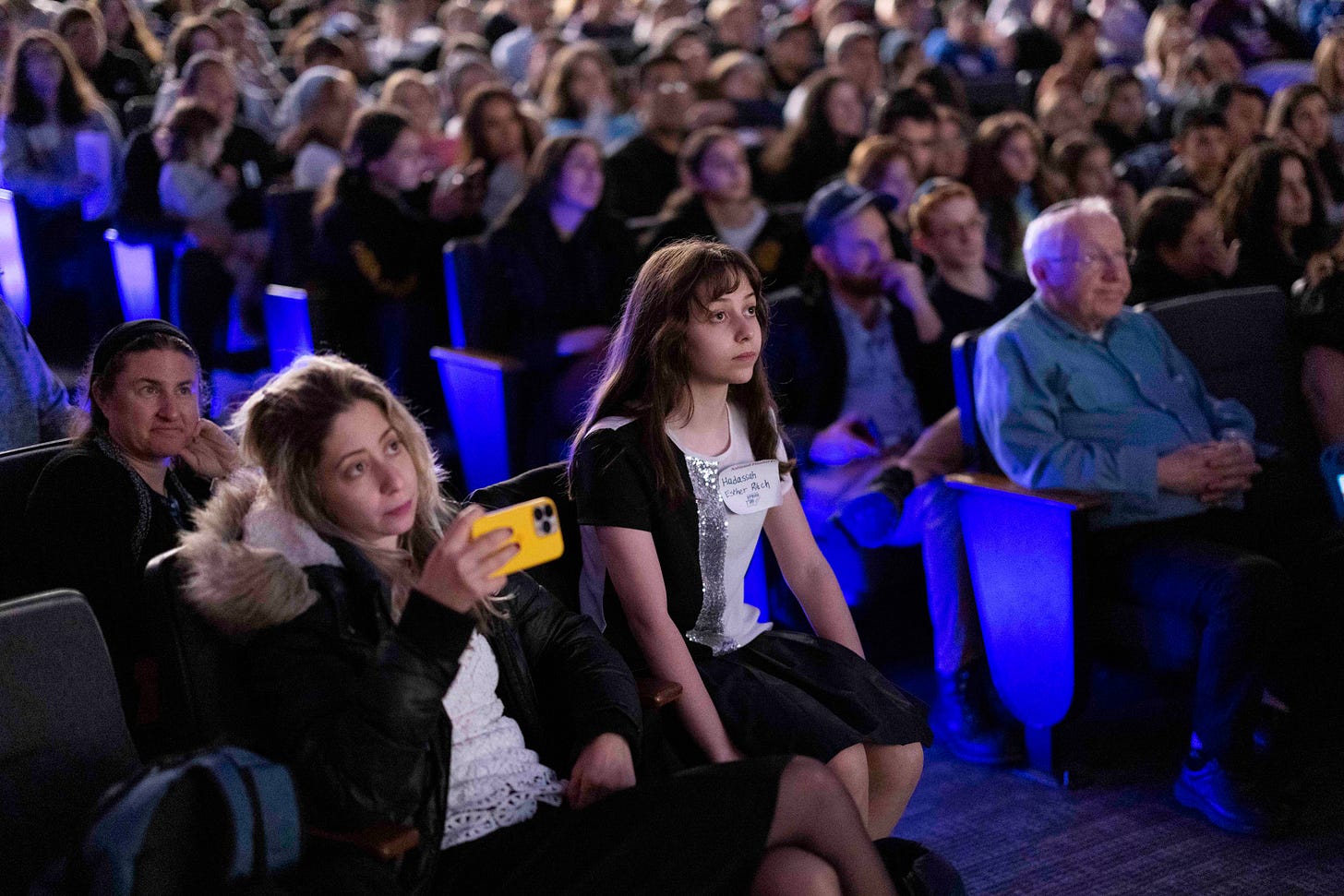
One week later, Hadassah Esther Ritch is back in Highland Park, New Jersey, and still daydreaming about walking across that stage—but, this time, in Israel in 2025.
“I picture the prime minister of Israel announcing my name,” she gushes over the phone. “And they’ve given me the microphone. And I tell him about how I want to become the prime minister of Israel, and how it’s like a dream to me, and how I want to lead Israel one day.”
She has already started studying for next year’s test, she tells me, after placing 14th this time.
“Every day since the finals, I’m studying like I’m fire,” Ritch says.
I ask the teenager if she means on fire.
“No, like I’m fire,” she corrects me. “You know like when you’re doing something and you start to get really good at it? And then you feel like, ‘whoa,’ like I feel like I could rise to the top, almost like with adrenaline and the will in your heart? Like, I’m going to do this. I’m going to push for hours. I’m going to do it every single break.”
Then she pauses: “It’ll never hurt to learn more.”
CORRECTION: An earlier version of this piece said that Bibi Netanyahu’s son won the Chidon Ha-Tanach in 2010. In fact, he won locally in Jerusalem to earn a spot in the international competition, then came in third overall. Also of note: the prime minister traditionally asks the final question, so Bibi posed the question that his son flubbed. Thanks to our friend Yair Rosenberg at The Atlantic for pointing this one out.
Olivia Reingold is a Free Press reporter. Read her piece about Hollywood’s Great Awakening here.
And to support more of our work, become a Free Press subscriber today:

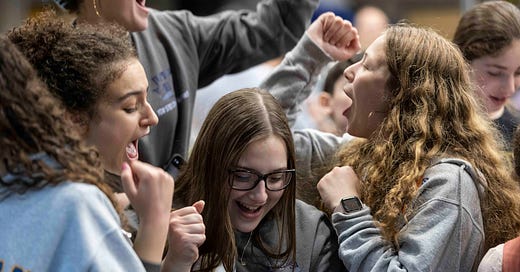

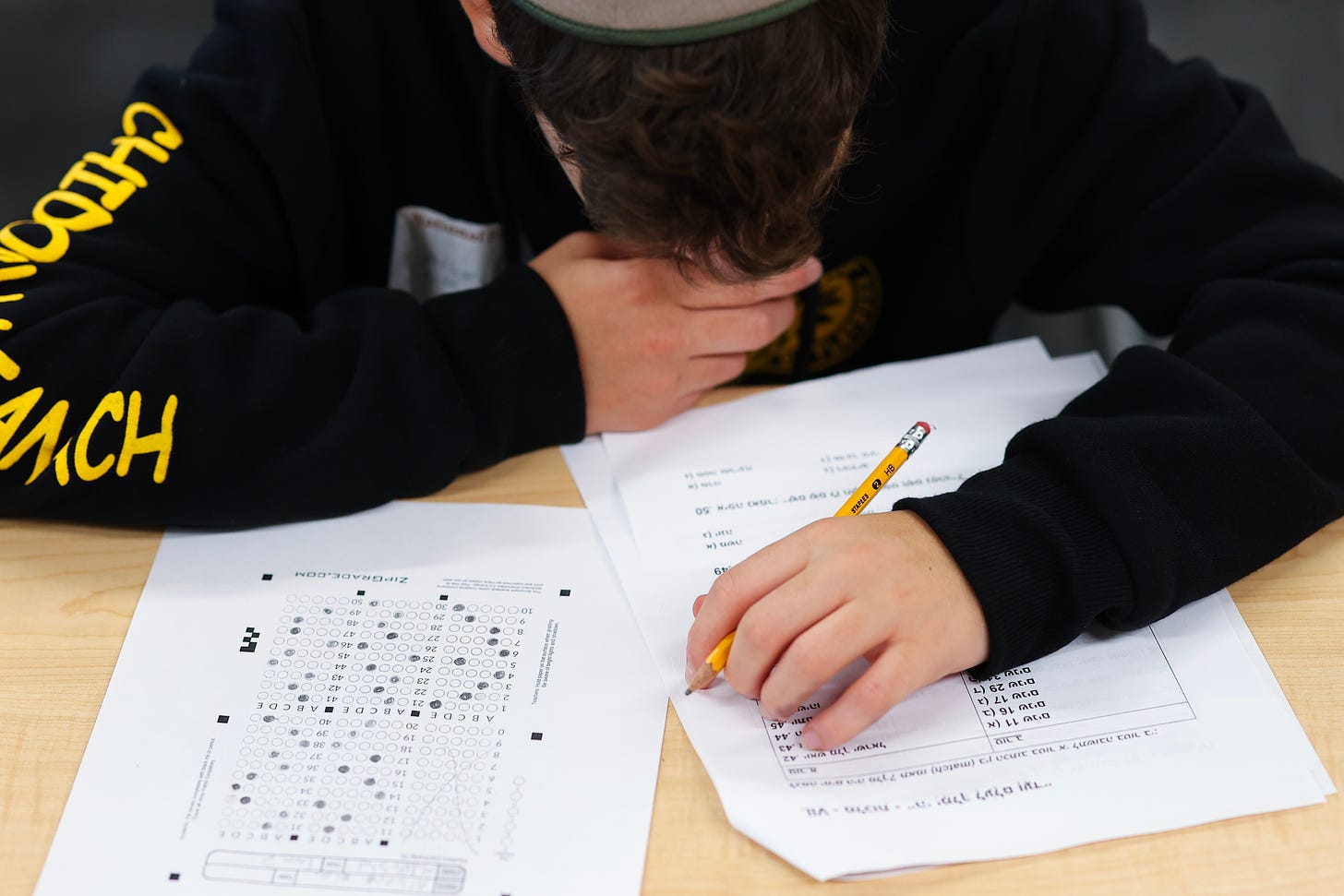
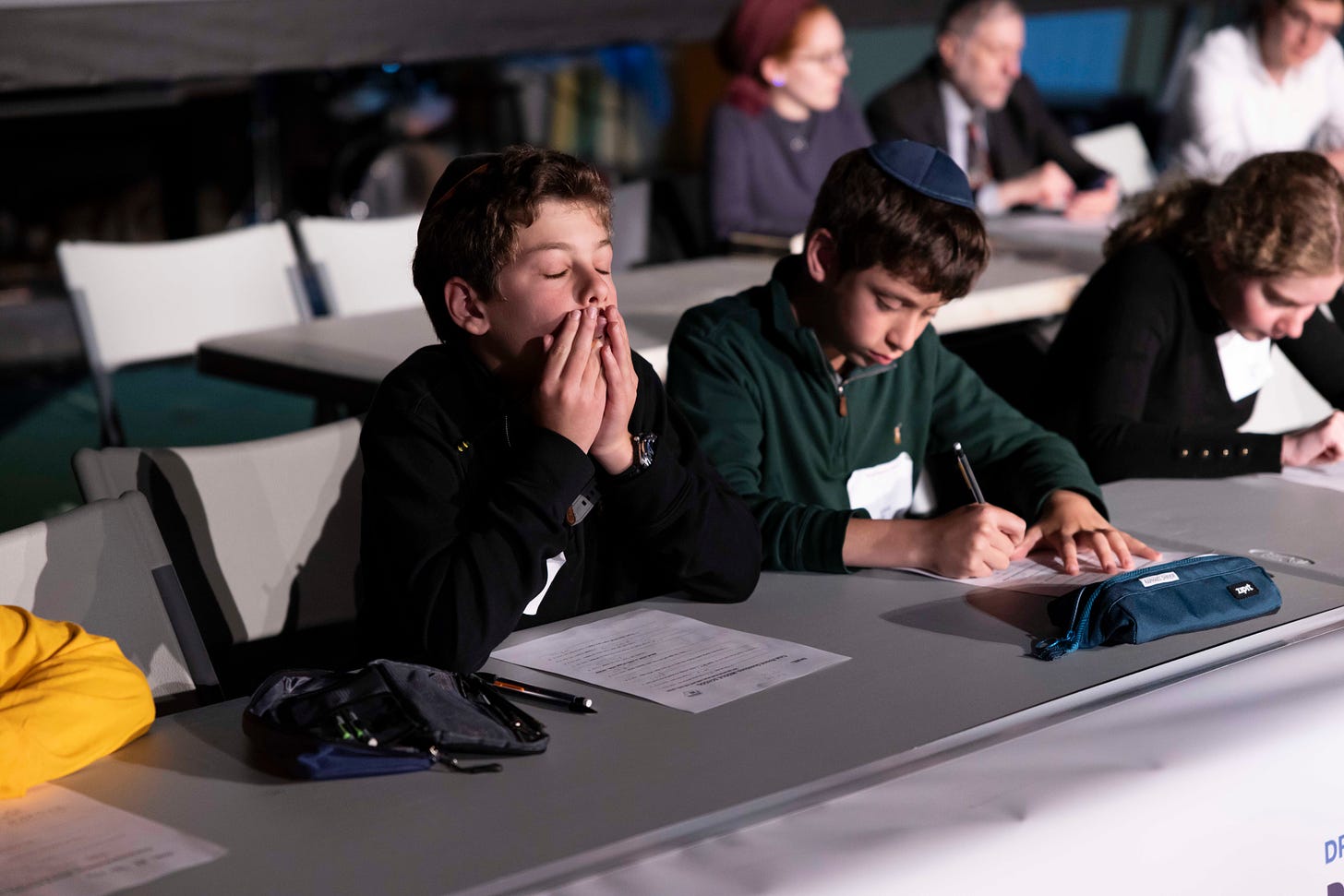
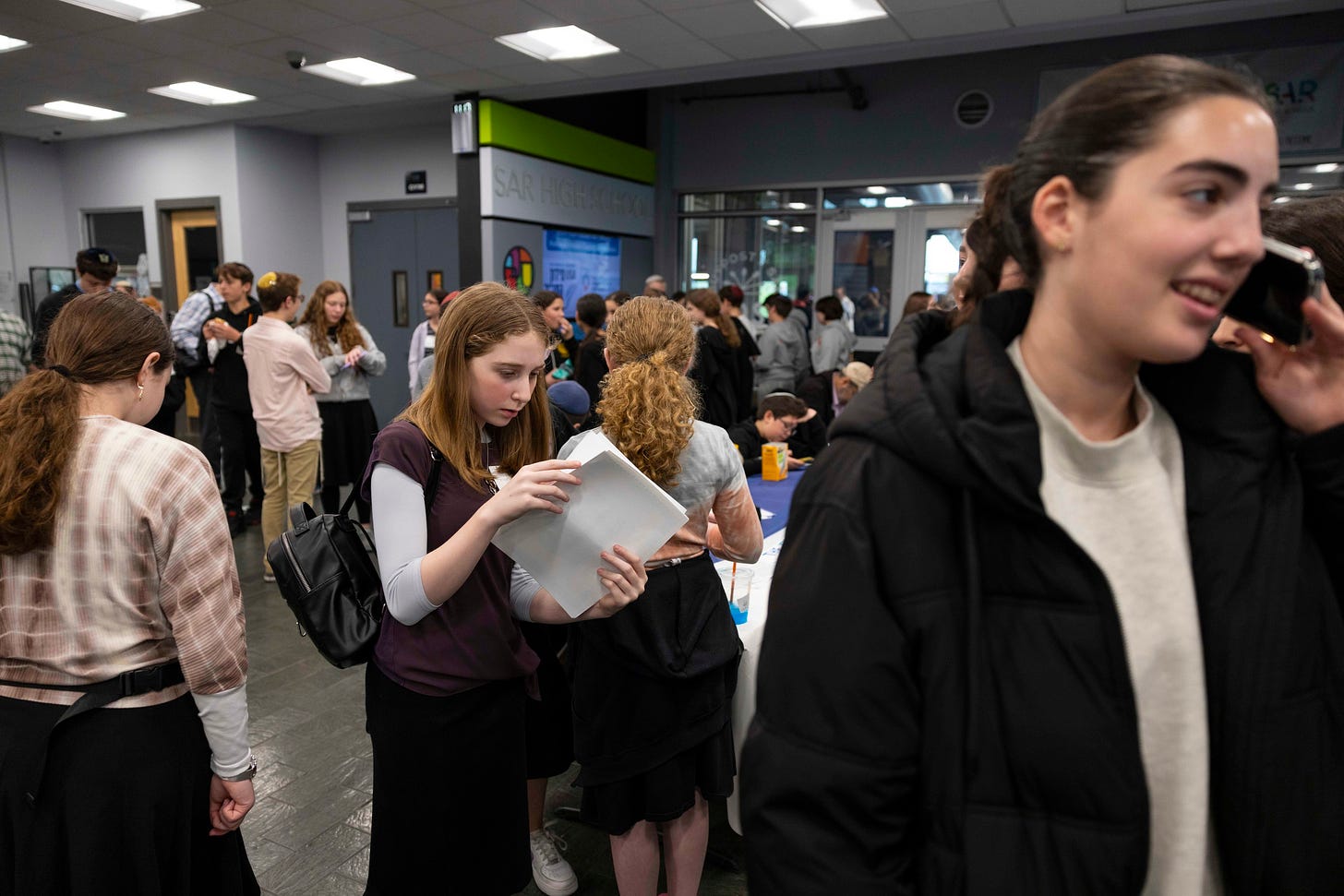






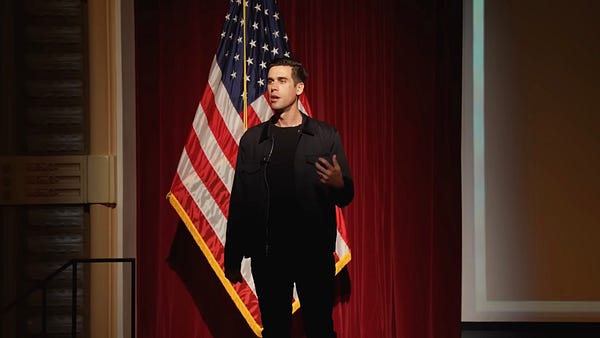

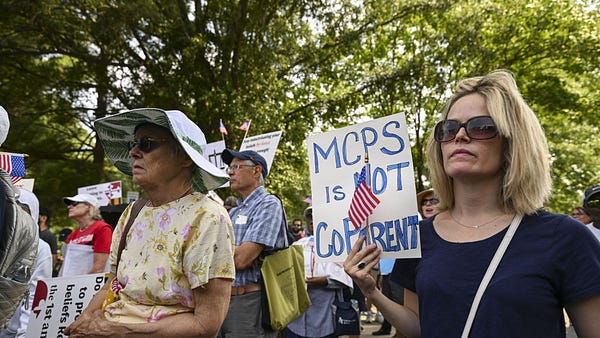

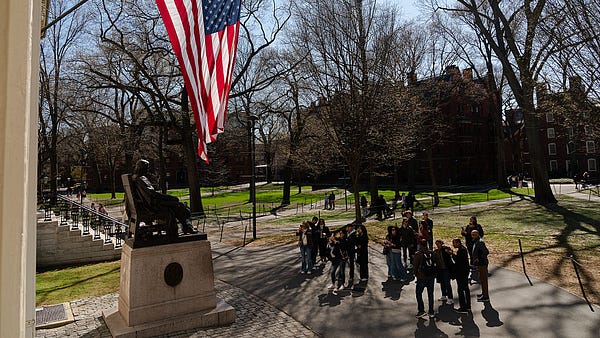

I'm not bragging, but...well, okay, I'm bragging. My daughter placed 4th in the nation in the Bible Quiz.
A beautiful story of great kids and families. It warms the heart to be reminded that there are kids with goals and dreams beyond getting likes on social media. Thank you Free Press for telling their story.